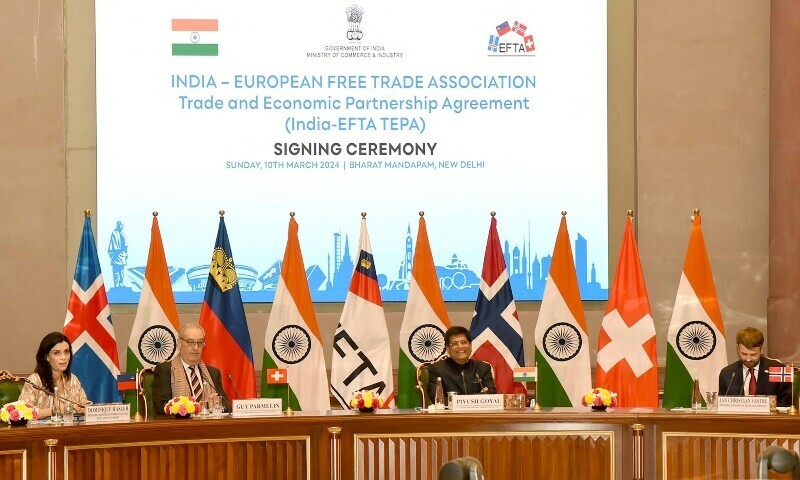India's New Trade Frontier: Exploring the EFTA Deal
On March 10th, 2024, India and the European Free Trade Association (EFTA) sealed a significant pact known as the Trade and Economic Partnership Agreement (TEPA).
India has diligently pursued negotiations for the Trade and Economic Partnership Agreement (TEPA) with the EFTA nations, which include Switzerland, Iceland, Norway, and Liechtenstein. The Union Cabinet, chaired by the Honorable Prime Minister, has granted approval for the signing of this pivotal agreement with the EFTA States.
Established in 1960, the EFTA is an inter-governmental organization dedicated to fostering free trade and economic integration among its four Member States. Through collaborative efforts, the EFTA aims to promote mutual prosperity and economic growth among its member nations.
The Trade and Economic Partnership Agreement (TEPA) represents a forward-looking and ambitious trade pact. Marking a significant milestone, India is set to ink its first Free Trade Agreement (FTA) with four developed nations, forming a crucial economic bloc within Europe. This historic collaboration not only signals India’s commitment to expanding its global trade footprint but also underscores the growing importance of partnerships with advanced economies.
Breaking new ground in the realm of FTAs, TEPA entails a binding commitment of $100 billion in investment and the creation of 1 million direct jobs over the next 15 years. This unprecedented pledge underscores the magnitude of the economic opportunities that lie ahead. By fostering a conducive environment for investment and job creation, TEPA is poised to inject dynamism into India’s economy, providing a significant boost to initiatives like Make in India.
Moreover, TEPA is poised to unleash a wave of opportunities for India’s young and talented workforce. The agreement is tailor-made to harness India’s demographic dividend by providing avenues for skill development, employment, and upward mobility. With a focus on innovation and entrepreneurship, TEPA empowers the youth to actively participate in and contribute to the country’s economic growth story.
On the trade front, TEPA opens up a gateway for Indian exporters to access not only the vast European market but also global markets beyond. By reducing trade barriers and facilitating smoother trade flows, the agreement enables Indian businesses to compete more effectively on the international stage. This newfound access to large markets presents a compelling opportunity for Indian enterprises to scale up their operations and expand their reach.
In essence, TEPA represents more than just a trade agreement—it is a catalyst for economic transformation and inclusive growth. By forging stronger ties with developed nations and committing to ambitious targets for investment and job creation, India demonstrates its readiness to embrace the challenges and opportunities of the global economy. As TEPA unfolds, it is poised to reshape the economic landscape, unleashing the full potential of India’s vibrant workforce and entrepreneurial spirit on the world stage.
Unveiling the Partnership: Key Features
- The India-EFTA Trade and Economic Partnership Agreement encompass a wide array of trade-related areas, including:
1. Trade in Goods: The agreement aims to liberalize trade in goods by reducing or eliminating tariffs on a broad range of products traded between India and the EFTA countries. This move is expected to enhance market access for exporters and importers on both sides, fostering greater trade flows and economic growth.
2. Trade in Services: Recognizing the growing importance of services in the global economy, the agreement includes provisions to facilitate trade in services, promote investment, and enhance cooperation in areas such as telecommunications, financial services, and professional services. This is particularly beneficial for India, known for its thriving services sector.
3. Investment Promotion: The partnership agreement is also geared towards promoting investment flows between India and the EFTA nations. By providing a conducive environment for investment through provisions on investor protection, dispute resolution, and intellectual property rights, the agreement aims to stimulate cross-border investment and spur economic development.
4. Intellectual Property Rights (IPR): Strengthening intellectual property rights protection is a key component of the agreement, ensuring that innovators and creators in both India and the EFTA countries are adequately rewarded for their contributions. This fosters innovation, encourages technology transfer, and enhances competitiveness in the global marketplace.
Implications and Benefits for India
The India-EFTA Trade and Economic Partnership Agreement hold several implications and potential benefits for India:
1. Market Access: Enhanced market access to the affluent EFTA countries opens up new opportunities for Indian exporters across various sectors, including textiles, pharmaceuticals, automotive, and information technology. Reduced tariffs and streamlined trade procedures make Indian products more competitive in the EFTA markets.
2. Diversification of Trade Partnerships: The agreement aligns with India’s broader strategy of diversifying its trade partnerships beyond traditional markets. By forging closer ties with the EFTA nations, India reduces its dependence on any single region for exports, thereby mitigating risks associated with geopolitical uncertainties and trade tensions.
3. Boost to Economic Growth: Increased trade and investment flows resulting from the partnership are expected to contribute to India’s economic growth trajectory. The agreement creates opportunities for job creation, technology transfer, and skills enhancement, driving innovation and productivity gains across various sectors of the economy.
Conclusion
The India-EFTA Trade and Economic Partnership Agreement heralds a new chapter in the economic relations between India and the EFTA member countries. By fostering deeper integration and cooperation, the agreement paves the way for mutual prosperity, innovation, and sustainable development. As India continues its journey towards becoming a global economic powerhouse, partnerships such as this underscore the country’s commitment to open, rules-based trade and investment regimes. With shared values of democracy, diversity, and entrepreneurship, India and the EFTA nations are poised to capitalize on the opportunities afforded by this landmark agreement, forging a path towards a more interconnected and prosperous future.




